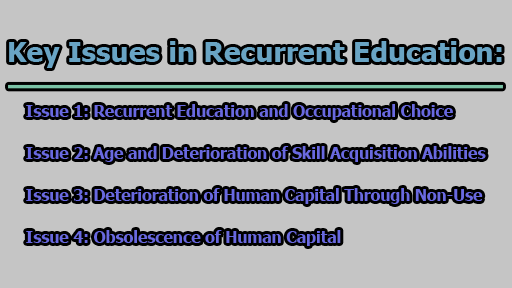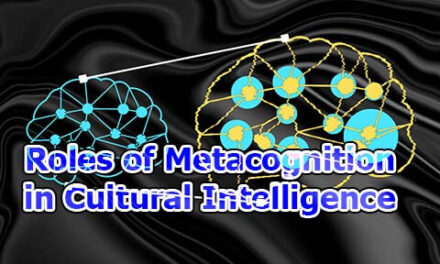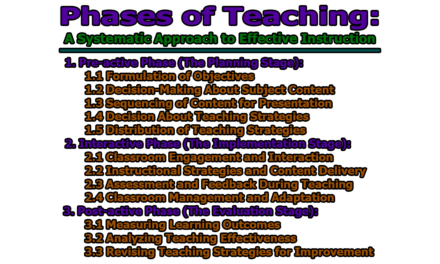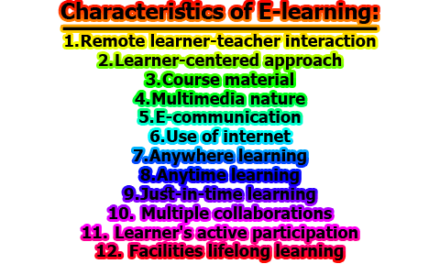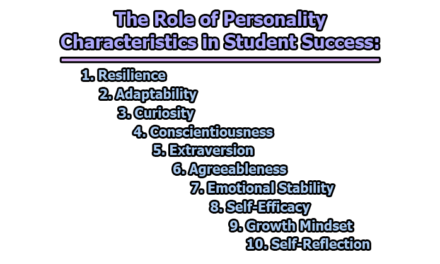Key Issues in Recurrent Education:
Recurrent education, often referred to as lifelong learning or adult education, is a critical component of contemporary educational systems. It recognizes that learning is not confined to early years and formal schooling but continues throughout an individual’s life. In an ever-evolving world, where technological advancements, changes in occupational demands, and social dynamics occur at an unprecedented pace, recurrent education plays a crucial role in ensuring that individuals can adapt, acquire new skills, and make informed occupational choices. This article will delve into several key issues in recurrent education, such as uncertainty and background influences in occupational choice, the impact of age on skill acquisition abilities, the deterioration of human capital through non-use, and the obsolescence of human capital.
Issue 1: Recurrent Education and Occupational Choice:
1.1 Uncertainty and Background Influences: The decision to pursue a particular occupation is influenced by numerous factors, including individual preferences, societal expectations, and economic conditions. Uncertainty is inherent in these decisions because predicting the future state of the job market and one’s own preferences and capabilities is challenging. Recurrent education should aim to address this uncertainty by providing individuals with the tools and knowledge needed to make informed decisions about their career paths.
- Economic Factors: Economic conditions significantly affect occupational choices. Job markets can be volatile, and the demand for specific skills can change rapidly. For instance, the COVID-19 pandemic exposed the vulnerability of certain occupations, like those in the travel and hospitality industry, while highlighting the resilience of jobs in healthcare and technology. Recurrent education should help individuals understand economic trends and equip them with skills that are likely to be in demand.
- Psychological Factors: An individual’s background, personal experiences, and psychological disposition also play a role in occupational choice. Recurrent education can help people assess their interests and strengths, providing guidance and opportunities for self-reflection. It can also offer psychometric assessments to aid in decision-making.
- Social and Cultural Influences: Family and societal expectations can significantly impact career choices. Recurrent education should help individuals navigate these external pressures and make decisions aligned with their own aspirations and capabilities.
- Information and Awareness: Recurrent education programs should facilitate access to accurate and up-to-date information about various career options. This helps individuals understand the requirements, prospects, and challenges associated with different occupations.
- Career Counseling: Providing career counseling services can be instrumental in helping individuals make informed choices. These services can assist in exploring different career paths, setting goals, and addressing challenges that may arise in the pursuit of a particular occupation.
1.2 Implications for Recurrent Education: To address uncertainty and background influences in occupational choice, recurrent education programs should be designed to provide a holistic approach to career development. This involves a combination of career counseling, skills training, and personal development. Additionally, these programs should be flexible and adaptable to accommodate changing economic conditions and individual needs. Promoting adaptability, continuous self-assessment, and fostering a growth mindset should be integral components of recurrent education initiatives.
Issue 2: Age and Deterioration of Skill Acquisition Abilities:
Age is a factor that significantly affects an individual’s ability to acquire new skills and adapt to evolving job requirements. As people grow older, they experience changes in physical and mental abilities, which can impact their capacity for learning. To address these challenges, recurrent education needs to consider age-related factors and adapt its strategies accordingly.
2.1 Physical Abilities:
- Motor Skills: As individuals age, there can be a gradual decline in fine and gross motor skills. This can impact their ability to perform certain physical tasks required in specific occupations.
- Endurance and Stamina: Older individuals may experience reduced endurance and stamina, affecting their ability to work long hours or engage in physically demanding jobs.
2.2 Mental Abilities:
- Cognitive Decline: Cognitive decline is a natural part of the aging process. It can affect memory, processing speed, and problem-solving abilities. This decline may hinder the acquisition of complex or technical skills.
- Resistance to Change: Older individuals may have established routines and ways of doing things, making them less receptive to new ideas or technologies. This can create resistance to learning new skills.
2.3 Implications for Recurrent Education: Recurrent education programs must consider age-related changes in skill acquisition abilities and tailor their approaches to accommodate the needs of older learners. This can be achieved through:
- Adaptive Learning Techniques: Utilizing adaptive learning technologies that adjust the difficulty of content to match the learner’s abilities. This ensures that older individuals are not overwhelmed with complex material.
- Skill Assessment: Conducting regular assessments to identify areas of strength and areas that require improvement. This helps individuals and educators focus on specific skills that need development.
- Flexibility: Offering flexible scheduling and part-time options to accommodate older learners who may have other commitments, such as work or caregiving responsibilities.
- Age-Appropriate Resources: Developing age-appropriate learning resources and materials that consider cognitive and physical limitations. These resources should use a variety of teaching methods to suit different learning styles.
- Mentorship and Peer Support: Encouraging mentorship programs and peer support networks to facilitate intergenerational learning. This allows older individuals to benefit from the knowledge and experience of younger generations.
Issue 3: Deterioration of Human Capital Through Non-Use:
Human capital refers to the stock of knowledge, skills, and abilities that individuals possess. Like any other asset, human capital can deteriorate over time if not regularly maintained and updated. The non-use of acquired skills and knowledge can lead to human capital depreciation, reducing an individual’s employability and overall quality of life.
- Skill Erosion: Skills that are not practiced or utilized regularly tend to deteriorate over time. For instance, a language learned in school may become rusty if not used in professional or personal life.
- Technological Obsolescence: In our rapidly changing technological landscape, skills that were once in high demand can become obsolete quickly. Individuals who do not continually update their knowledge risk falling behind.
- Declining Industry Relevance: As industries evolve, the skills required may change. Professionals who do not adapt to these changes may find themselves ill-suited for their current roles.
- Loss of Confidence: When individuals do not use their skills, they may lose confidence in their ability to perform tasks associated with those skills. This can be a barrier to re-entry into the job market.
3.1 Implications for Recurrent Education: To combat the deterioration of human capital through non-use, recurrent education programs should emphasize the following strategies:
- Skill Maintenance Programs: Offering refresher courses or skill maintenance programs for individuals who wish to keep their knowledge and abilities up-to-date without committing to full-time education.
- Technology Integration: Incorporating technology and online learning platforms to provide accessible and convenient opportunities for individuals to update their skills.
- Recognition of Prior Learning: Recognizing and providing credit for prior learning and work experience, so individuals do not have to start from scratch in their educational pursuits.
- Lifelong Learning Culture: Promoting a culture of lifelong learning in society, where individuals understand the importance of continually developing their skills and knowledge.
- Financial Support: Providing financial incentives or support for individuals seeking recurrent education, such as grants, scholarships, or tax incentives.
Issue 4: Obsolescence of Human Capital:
In addition to the deterioration of human capital through non-use, another critical issue is the obsolescence of human capital. This occurs when an individual’s skills and knowledge are no longer relevant in the labor market due to technological advancements, changes in industry practices, or shifts in job requirements. Addressing this issue is vital to ensure individuals remain competitive in the workforce.
- Technological Advancements: The rapid evolution of technology can render skills and knowledge obsolete. For example, the rise of automation and artificial intelligence may make certain manual or routine tasks redundant.
- Industry Disruption: Changes in industry dynamics, such as the introduction of disruptive business models or shifts in market demands, can lead to the obsolescence of certain skills. For instance, the decline of traditional retail due to the growth of e-commerce has affected employment in the retail sector.
- Globalization: The interconnectedness of the global economy means that job markets are influenced by international trends and competition. Skills that are relevant in one country may not be as valuable in another.
- Environmental and Social Factors: Emerging issues, such as climate change or changes in societal values, can create new job opportunities while reducing the relevance of existing skills. For instance, the growing emphasis on sustainable practices may affect employment in certain industries.
4.1 Implications for Recurrent Education: To address the obsolescence of human capital, recurrent education must be forward-looking and adaptable. Key strategies to consider include:
- Industry-Relevant Curriculum: Ensuring that educational programs align with the current and future needs of industries. This may involve close collaboration between educational institutions and businesses to identify emerging skills requirements.
- Technological Literacy: Incorporating digital literacy and technological competence as foundational skills in recurrent education programs. This equips individuals with the ability to adapt to new technologies and tools.
- Lifelong Learning Mindset: Fostering a mindset of continuous learning and adaptability, so individuals are more inclined to update their skills and knowledge in response to changing market demands.
- Career Transition Support: Providing resources and support for individuals looking to transition to new career paths when their existing skills become obsolete. This may include career counseling, upskilling programs, and job placement services.
- Government and Employer Initiatives: Encouraging governments and employers to invest in employee training and development, recognizing that a skilled workforce is crucial for innovation and competitiveness.
In conclusion, recurrent education is a vital component of modern society, addressing numerous challenges related to occupational choice, age-related skill acquisition abilities, the deterioration of human capital through non-use, and the obsolescence of human capital. By considering the issues and implications discussed in this article, educational institutions, governments, and individuals can work together to create a more resilient and adaptable workforce that can thrive in an ever-changing world. Recognizing that learning is a lifelong journey, individuals can continually acquire new skills, adapt to shifting demands, and make informed choices about their careers, ultimately contributing to their personal growth and societal development.

Library Lecturer at Nurul Amin Degree College

